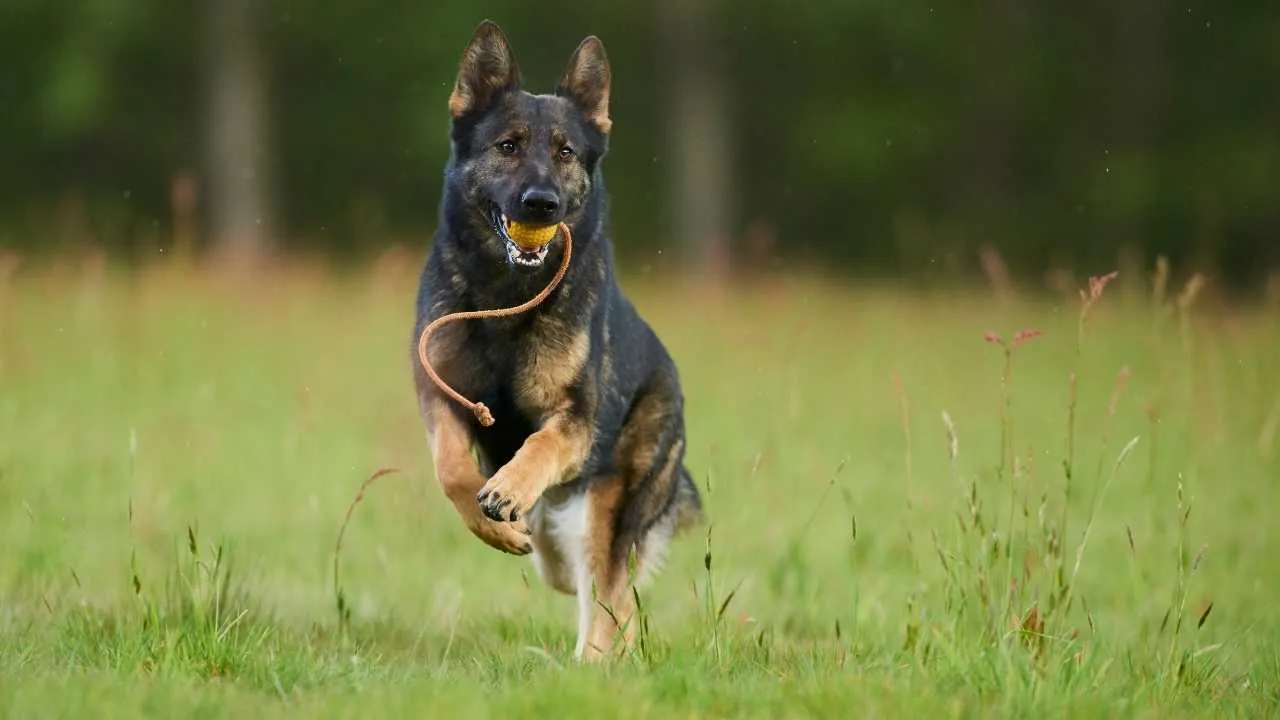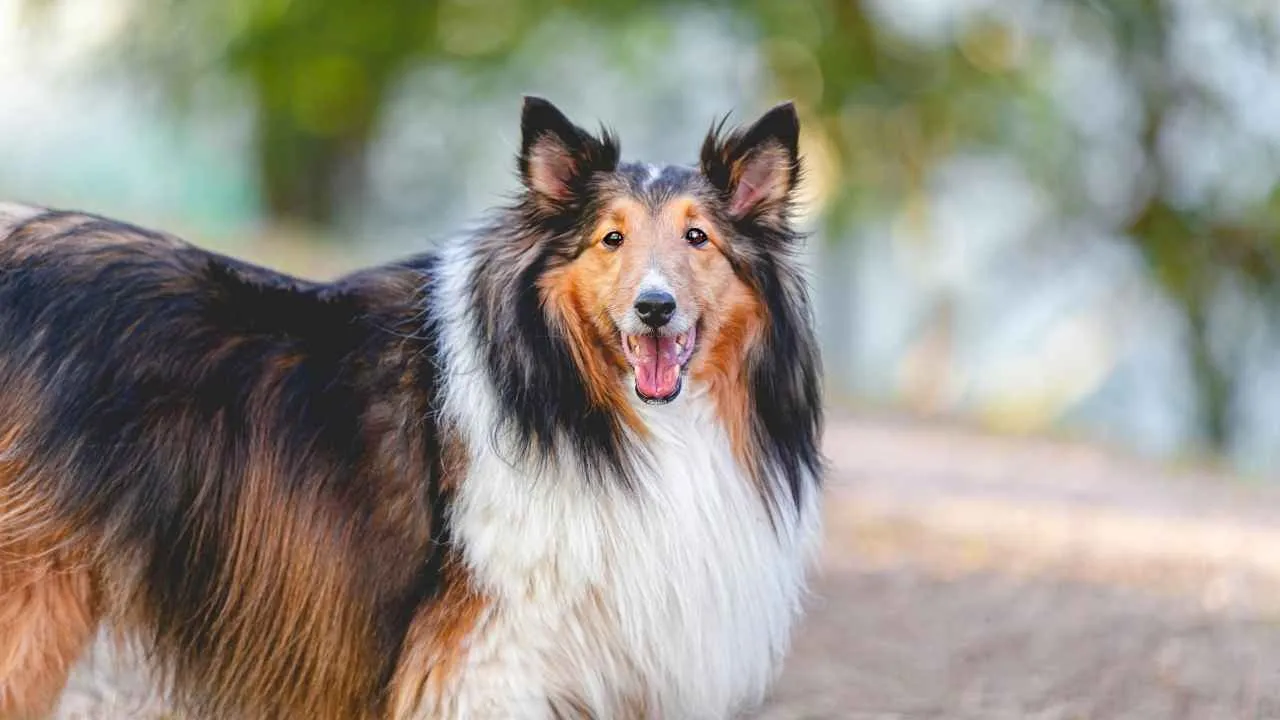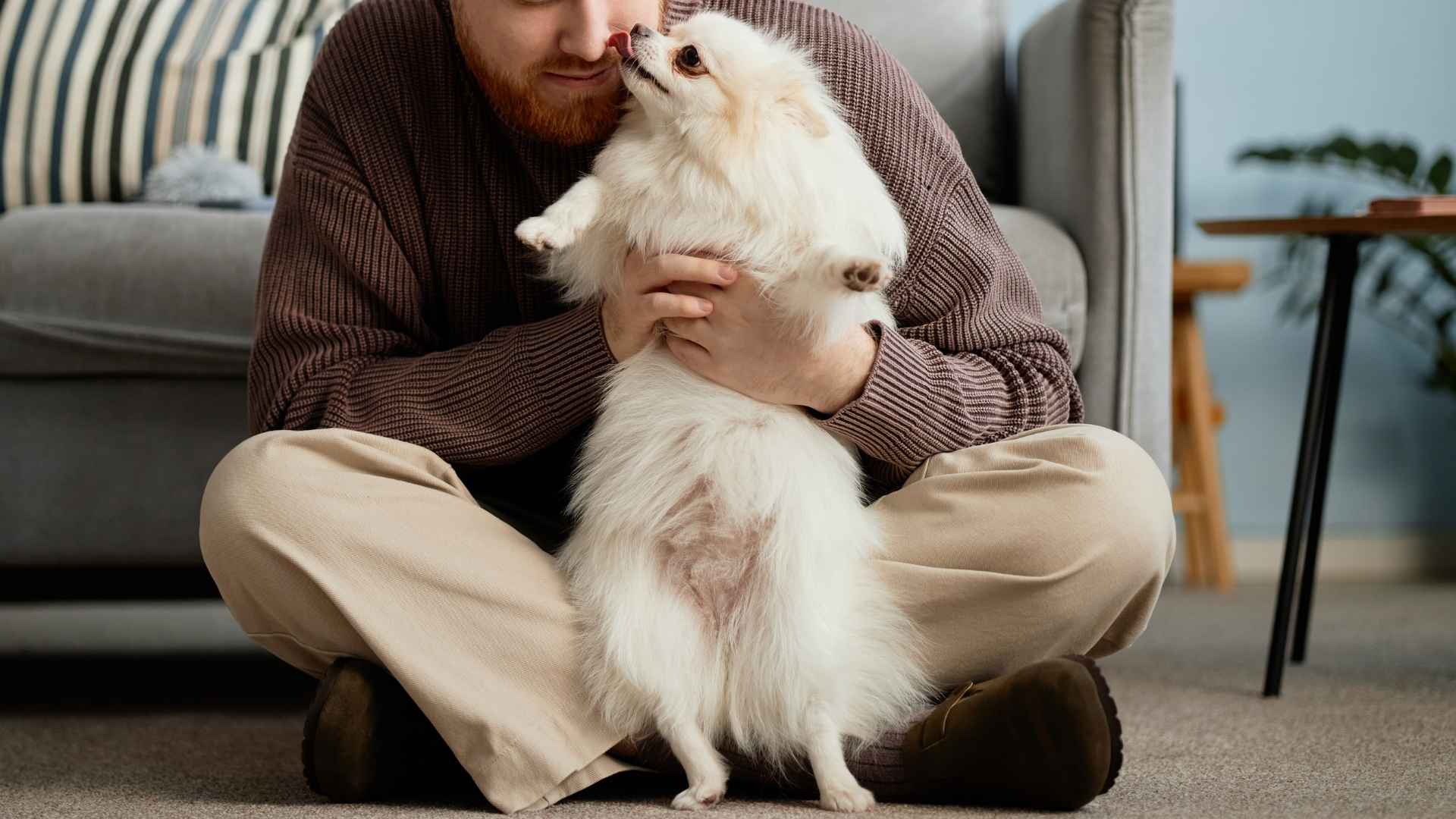Emotional support dogs offer more than companionship—they provide a grounding presence and quiet strength when life feels overwhelming. While many breeds are known for their affection, some stand out for their calm confidence and intuitive connection with people. These dogs don’t just follow commands; they seem to understand unspoken emotions, responding with steady reassurance and loyalty.
Their self-assured nature helps ease anxiety, uplift mood, and offer a sense of safety without demanding constant attention. Whether you’re navigating daily stress or deeper emotional challenges, a confident emotional support dog can make a profound difference. They are observant, responsive, and consistent—qualities that bring comfort in uncertain moments.
This blog explores the breeds that embody both emotional sensitivity and quiet resilience, making them uniquely suited to offer support with unwavering dependability.
Confident Emotional Support Dog Breeds
1. American Staffordshire Terrier

The American Staffordshire Terrier is a confident and emotionally intuitive breed that thrives as an emotional support companion. Known for their loyalty and steady temperament, these dogs form powerful bonds with their humans. Their presence alone can bring a sense of security and calm, especially to those facing anxiety or emotional strain.
Britannica states this breed is prized for its emotional awareness. American Staffordshire Terriers often mirror the energy and mood of their owners, responding with quiet companionship when needed most. This instinctive ability to tune in makes them especially grounded during moments of stress or overstimulation.
Despite their muscular build and bold appearance, these dogs are incredibly affectionate. They seek closeness and connection, often leaning in for physical contact or quietly resting beside their owners. This balance of strength and tenderness creates a comforting emotional anchor for those in need of steady support.
Their confidence also plays a vital role. Unlike more timid breeds, the American Staffordshire Terrier remains calm in unpredictable situations. This poise can be reassuring to individuals who experience panic or heightened emotional responses, helping create a more stable environment.
Highly trainable and eager to please, they adapt well to structured emotional support roles. With consistent guidance, they can learn tasks or cues that provide meaningful assistance to their owners, from alerting to emotional distress to offering grounding pressure through physical contact.
American Staffordshire Terrier offers a rare combination of emotional intelligence, loyalty, and confidence. These traits make them not only capable support animals but also deeply devoted companions who provide unwavering comfort through life’s emotional challenges.
2. Golden Retriever

Golden Retrievers are widely regarded as some of the best service dogs, thanks to their gentle demeanor and ability to make deep connections with people. Known for their intelligence and affectionate temperament, they excel at providing emotional support for individuals dealing with mental health disorders such as anxiety, depression, and stress.
With a friendly disposition, the Golden Retriever exudes warmth, instantly making others feel comfortable and at ease. Their floppy ears, soft and playful, add to their charm, gently swaying with each movement like tender whispers of affection. Together, they create an aura of comfort and joy, making them the perfect companions.
Goldens make great therapy dogs thanks to their calm demeanor and intuitive understanding of human emotions. Golden Retrievers have an innate ability to sense when their owner needs support, offering affection and reassurance, making them great choices for individuals facing mental health conditions. Their consistent presence can help alleviate the symptoms of emotional distress, offering comfort over long periods.
Golden Retrievers are highly trainable, which makes them ideal for providing emotional support in a structured and reliable manner. Their eagerness to please and gentle nature ensures they form strong bonds with their owners, making them more than just pets—they become steadfast companions through life’s ups and downs.
Their ability to adapt to various environments and their natural affection for people further solidify their role in support and service tasks. Whether assisting with emotional regulation or offering a comforting presence, Golden Retrievers are incredibly effective at improving the mental well-being of those they support.
Golden Retrievers make excellent emotional support animals not only for their intelligence but for their unwavering commitment to offer comfort. Their affectionate behavior, combined with proper training, makes them some of the most reliable and beneficial companions for anyone seeking emotional support.
3. Labrador Retriever

Labrador Retrievers are prized for their friendly nature and high intelligence. Originally bred as working dogs, they are highly trainable and thrive on human interaction. Their eagerness to please and gentle demeanor make them excellent companions for those seeking comfort and support.
These dogs are particularly effective in alleviating anxiety and improving mood. Labradors’ calm presence helps individuals dealing with panic attacks or depression, offering comfort and stability in stressful situations. Their intuitive nature and affectionate behavior make them naturally skilled at providing emotional relief.
Labradors are also highly adaptable, excelling as both therapy and service dogs. Their large size and gentle temperament make them great companions for families, children, and adults alike, offering support during challenging times.
Active and energetic, Labradors enjoy outdoor activities, making them a good match for individuals who appreciate movement. Their intelligence ensures they are highly trainable, enhancing their ability to assist in emotional regulation.
Their versatility, combined with their affectionate and patient nature, makes Labradors some of the most beneficial emotional support animals. Their constant companionship provides unwavering comfort, making them a top choice for those in need of emotional support.
4. German Shepherd

The German Shepherd is celebrated for its confidence, intelligence, and deep loyalty. Known for their history as working dogs, they were originally bred for tasks that required both mental and physical strength, making them naturally equipped to provide therapeutic benefits. Their strong bond with humans and their protective nature make them ideal companions.
German Shepherds excel as emotional support animals because of their natural empathy. They can sense when their owner is feeling anxious, stressed, or down, and they instinctively offer comfort. Their ability to provide support in difficult moments makes them incredibly valuable to those struggling with mental health challenges, such as anxiety or depression.
The intelligence and adaptability of German Shepherds make them highly effective emotional support animals. They can be trained to recognize and respond to their owner’s emotional cues, whether by offering physical comfort or signaling distress, making them dependable and responsive companions.
Their natural protective instincts create a strong sense of security, which is especially helpful for individuals who feel anxious or emotionally vulnerable. Calm under pressure, German Shepherds maintain composure in challenging situations, offering a reassuring presence when it’s needed most.
Their unwavering dedication to their human companions is another reason they excel in this role. German Shepherds build deep, lasting connections and consistently offer comfort and companionship, making them well-suited for those requiring steady emotional support over time.
Combining sharp intuition, emotional awareness, and steadfast loyalty, the German Shepherd stands out as a confident and capable support dog. Their ability to detect emotional changes and respond with quiet strength makes them ideal for fostering emotional balance and peace of mind.
5. Collie

The Collie is a naturally compassionate and confident breed, admired for its intelligence, sensitivity, and strong human connection. Originally bred as herding dogs in the Scottish Highlands, Collies developed a keen awareness of their environment and close communication with their handlers. This heritage shaped them into emotionally perceptive dogs with a deep capacity for companionship.
Their innate ability to read people’s emotions allows them to offer comfort with quiet ease. Collies intuitively sense stress or sadness and respond with gentle, steady presence—whether by staying close during anxious moments or simply offering silent reassurance. Their empathy makes them powerful sources of emotional stability.
Highly trainable and eager to please, Collies excel in support roles. They quickly learn tailored cues or tasks, such as providing physical contact during distress or responding to emotional changes, making them both intuitive and responsive companions.
What makes Collies especially effective is their balanced demeanor. They bring calm without being passive, and confidence without being overwhelming. This makes them a dependable grounding presence for individuals in need of emotional regulation and consistency.
PetMD states Collies naturally form strong bonds with their families and stay close, offering unwavering support during emotional highs and lows. Their presence is more than comforting—it’s emotionally anchoring.
Altogether, the Collie’s blend of empathy, calm assurance, and unwavering devotion makes it one of the most effective emotional support dogs. With a gentle heart and intuitive mind, this breed delivers exactly what’s needed—when it’s needed most.
6. Poodle

The Poodle is a standout as an ideal companion dog, offering a unique combination of intelligence, sensitivity, and calmness. Their ability to sense their owner’s emotions, coupled with their steady nature, makes them excellent companions during challenging times. Poodles are naturally intuitive and can easily detect when their owners need comfort or support.
Known for their exceptional intelligence, Poodles are highly trainable, allowing them to provide structured emotional support. Their quick learning ability ensures they can be taught various tasks to assist with mental health challenges, making them reliable companions for emotional well-being.
Poodles’ confident yet gentle demeanor allows them to offer emotional stability without overwhelming their owners. Whether it’s through their calm presence or by providing comfort during moments of anxiety, they instinctively know when to engage and when to simply be there as a steady presence.
Their affectionate nature adds to their effectiveness as assistance dogs. Poodles form deep emotional bonds with their owners, offering consistent companionship and care. Their playful yet composed temperament helps lift spirits, providing relief to those struggling with stress or depression.
Poodles excel in creating a balanced environment. Their high energy levels, combined with their ability to settle into a calm state, make them adaptable in various situations. They can keep up with active individuals while also providing a serene and soothing presence when needed.
Overall, the Poodle’s confidence, intelligence, and emotional sensitivity make it an ideal choice for those seeking an emotional support dog. Their versatility, gentle nature, and intuitive understanding of their owners’ needs ensure they are not only excellent companions but highly effective support animals.
7. Pembroke Welsh Corgi

The Pembroke Welsh Corgi combines a cheerful spirit with steadfast loyalty, making it a naturally uplifting emotional support companion. Its history provides some insight into why this breed excels in providing comfort. Originating in Wales, these dogs were primarily bred for herding cattle and other farm animals.
Despite their small size, Corgis were known for their strong work ethic and courage. This background in herding has contributed to their alertness and ability to sense the emotions and needs of those around them, making them highly effective emotional support dogs.
Corgis are known for their affectionate and loyal nature, traits that have been refined over centuries of working closely with humans. Their history as farm dogs meant they were used to being in close contact with people, forming strong bonds and understanding human behavior.
This deep emotional connection with humans makes them particularly suited for providing emotional support, as they instinctively know when to offer companionship and when to simply sit quietly beside their owners.
As noted by AKC, Corgis are energetic and playful, and their temperament is also calm and steady. They are known to remain composed, offering a grounding presence when their owners need reassurance. Their ability to provide emotional stability without being overbearing is a key trait of great emotional support animals.
The affectionate and sociable nature of the Pembroke Welsh Corgi is another factor that contributes to their success as emotional support dogs. These dogs are known for their loyalty and loving demeanor. Their intuition and ability to bond with their owners make them natural therapy dogs, offering comfort during difficult times.
Corgis are also adaptable to family life, making them an excellent choice for households of all types. Their size and temperament allow them to fit well into smaller living spaces, offering support to individuals or families while being easy to manage.
Conclusion
Choosing the right dog for emotional support can make a profound difference in one’s well-being. While certain breeds like the Cavalier King Charles Spaniel and Yorkshire Terrier are often celebrated for their affectionate nature, it’s the combination of personality, confidence, and intuition that defines an ideal emotional support dog.
Whether it’s a calm presence during tough moments or simply being a loyal furry friend, friendly dogs with steady temperaments help create a sense of safety and connection. From intelligent responses to emotional cues to offering comfort that improves mood, these dogs are more than pets—they’re lifelines.
While many other breeds and other pets may offer comfort, confident emotional support dogs stand out for their unique ability to respond with reliability and care. Ultimately, finding a companion that aligns with your needs and lifestyle ensures not just support but genuine companionship and emotional balance.


